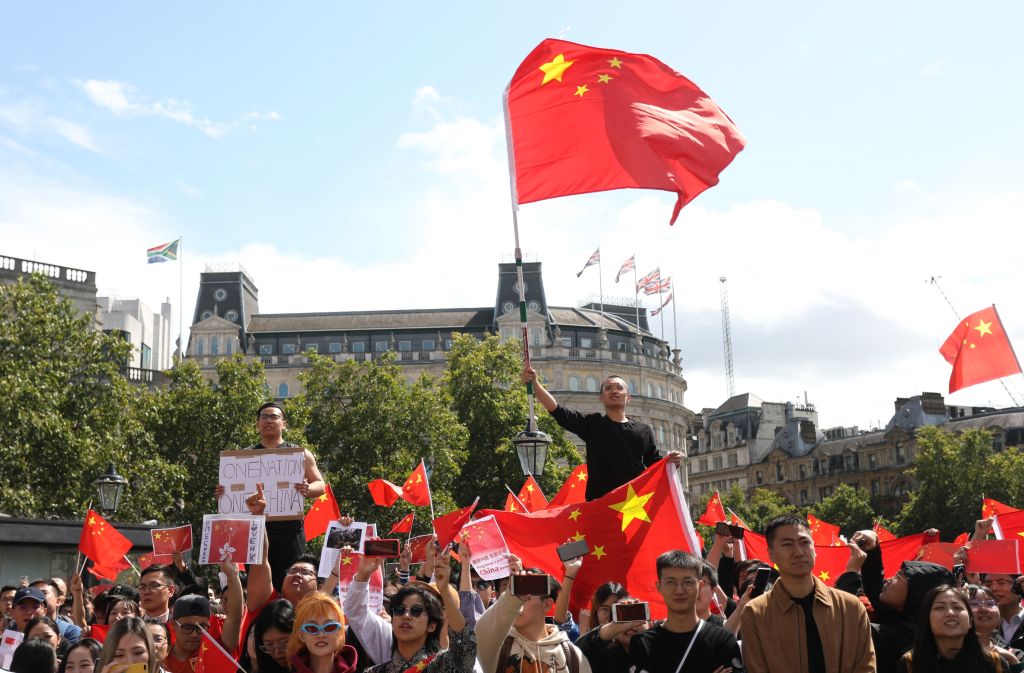Across the world last weekend, pro-Beijing demonstrators took to the streets. In London, Melbourne and Calgary, people waved the five-starred red flag and belted out the Chinese national anthem. It was a display of national pride towards China. But marchers also wanted to send a message to Hong Kong: those protesting against the Chinese government should be ashamed of themselves.
Take this video, filmed in Toronto. Pro-Beijing marchers chant ‘national sell-outs’ – a reference to demonstrators in Hong Kong – at the pro-Hong Kong marchers opposite:
加拿大多伦多留学生和华人大骂港独废青是卖国贼 pic.twitter.com/lh0XaANOR5
— 热门表哥 (@westernmedia_sb) August 18, 2019
Their show of solidarity with the Chinese government – and opposition to Hong Kongers – might seem surprising to a Western audience. But back home, mainlanders swelled with pride at overseas students out defending Beijing. On WeChat, a messaging app popular in China, my family friends shared this comment thread:
‘We are proud of you! Mother China has your back, and you are China’s future! Let us strive together for a stronger China’

Other comments below were equally passionate:
‘We are Chinese – China will always be in our hearts!’
‘Every time the West thinks China will completely collapse, the Chinese people immediately unite, bringing with them incomparable patriotism to protect the nation’
Unlike the rest of the world, many Chinese have been utterly unimpressed by the protests in Hong Kong. Offended, in fact. The rhetoric of these mainlanders – in marches and on social media – shows why. For these people, the state and the country are the same. Supporting the Chinese government then becomes a way of showing one’s patriotism.
And for those taking to the streets in Hong Kong? Their opposition to the government is taken as a sign that they are anti-China. This perception among many mainlanders is hardly helped by protestors who deface the Chinese flag. Nor by those using the British and American flags as symbols of their protest, making it an international issue on which the Hong Kongers are supposedly siding with foreigners. It lands badly with the mainland audience, even without state media fanning the fire.
Grandma Wong, a regular at #HongKong protests, uses a British flag to obstruct the view of a police officer filming protesters outside their headquarters in Wan Chai. 👉 In full: https://t.co/kmLJLFCnSX pic.twitter.com/EAOpppDUwm
— Hong Kong Free Press HKFP (@hkfp) June 26, 2019
So forget censorship or propaganda, the most effective tool in the Chinese Communist party’s arsenal is patriotism. Sure, censors manipulate the narrative on mainstream media. But their real weapon is social media, where proud Chinese citizens are doing the hard work for them.
No doubt years of propagandistic education have paid off to the benefit of the government (though when I speak to young Chinese, it seems that years of tedious Marxist dogma have just switched them off, rather than make them any more political). But when China and the Chinese government is presented as one and the same, the Chinese Communist party is the clear winner; the CCP is able to channel deep loyalty to the concept of an united Chinese civilisation into loyalty for itself.
To Brits, this might seem bizarre. We find it easy enough to criticise Boris Johnson while remaining proud of being British. But while the fortunes of British prime ministers and their respective parties wax and wane, it’s different in China. The Chinese Community party has been there for the better part of a century. And it isn’t going away any time soon. For many mainlanders, it’s no easy task to extricate what’s communist and what’s just Chinese.







Comments